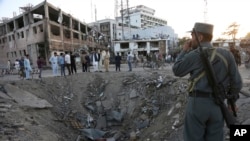A bombing in Afghanistan’s capital killed at least 90 people and injured hundreds more Wednesday morning.
The bomb was hidden in a truck designed to carry sewage. It exploded in the center of Kabul, near a number of foreign embassies.
The Reuters news agency said it was one of the worst bombings in a city where terrorism is an ongoing threat.
Afghan government officials reported the number of casualties Wednesday night -- more than 12 hours after the explosion. Officials warned that the number of deaths might grow because of the large number of injuries.
Alef Ahmadzai drives vehicles equipped for taking the injured to medical centers. He told the Associated Press “I have been to many attacks, taken wounded people out of many blast sites, but I can say I have never seen such a horrible attack as I saw this morning.”
Most of the victims appeared to be civilians, Reuters reported. Victims included women and children, said a spokesman of the public health ministry.
But the dead also included Afghan security guards, including nine guards working at the United States Embassy. The U.S. State Department said 11 American contract workers were wounded in the attack.
‘Felt like an earthquake’
Mohammed Hassan, 21, was attending training at a bank close to the area where the truck exploded. “It felt like an earthquake,” he told Reuters.
Hassan had a bandage covering his head wound. But blood covered his white dress shirt.
The bomb hit the diplomatic area of Kabul, damaging many embassy buildings and vehicles.
There were no early claims of responsibility. The Afghan Taliban denied responsibility. The group criticized all attacks on civilians.
Warnings of attacks
Security agencies in Afghanistan had been warning that militants were planning attacks on major targets for the start of Ramadan. The Muslim holy month began last week.
Horia Mosadiq is a researcher for the human rights group Amnesty International.
She said, “The bombing in Kabul is a horrific act of violence and a heartbreaking reminder of the toll that Afghan civilians continue to pay in a conflict where armed groups deliberately target them and the government fails to protect them.”
Mosadiq said the explosion shows that the long war in Afghanistan is far from over and appears to be widening.
Some Afghans went on social media to question if foreigners care about the continued violence they face.
“Bombings in Afghanistan and the world is silent like usual,” tweeted a woman known as Afghan Meezus. “People wonder why we're prideful people. Because we suffer in silence and alone.”
A man in Iraq, where there have also been recent bombings, wrote back to her. “Iraq feels your pain & we stand…with Afghanistan till the end!”
The bombing took place near the entrance to the German embassy in Kabul. It injured several embassy workers, according to German Foreign Minister Sigmar Gabriel. Pictures showed the embassy building with its windows wrecked by the explosion.
Afghan President Ashraf Ghani called the explosion an “inhuman and cowardly attack” against innocent civilians during Ramadan.
In Washington, a State Department official said the attacks "once again show the terrorists' complete disregard for human life."
I’m Jonathan Evans.
Ayaz Gul reported on this story for VOANews.com. Bruce Alpert adapted this story for Learning English, with additional reporting from the Associated Press and Reuters. George Grow was the editor.
We want to hear from you. Write to us in the Comments Section and share your views on our Facebook Page.
___________________________________________________________
Words in This Story
blast - n. an explosion
bandage - n. a covering (such as a strip of cloth) that protects or supports part of the body that has been hurt
reminder - n. something that causes you to remember or to think about something
toll - n. the number of people who are killed or injured in an accident, disaster, or attack
deliberately - adv. in a way that is meant, intended, or planned
cowardly - adv. afraid in a way that makes you unable to do what is right or expected
disregard - n. to ignore something or the causes of your action
casualty – n. someone lost through death, wounds or injury
sewage – n. refuse liquids or waste











